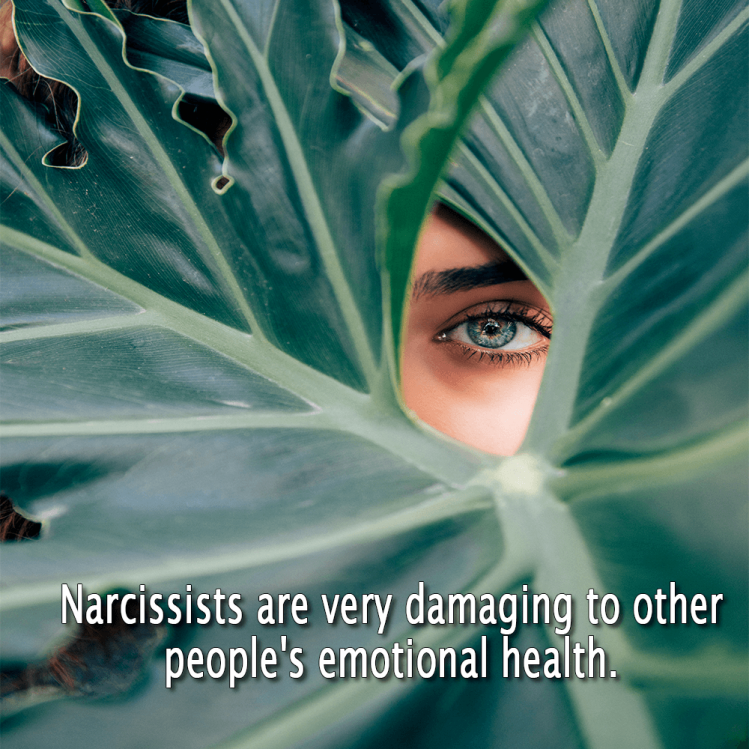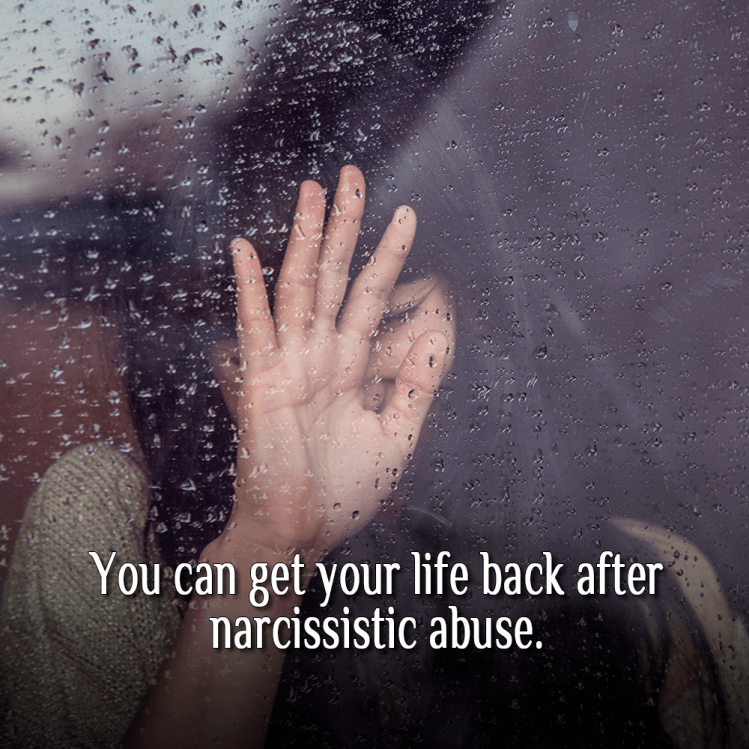Narcissism
Lesson 2
Introduction
Until quite recently, most people equated narcissism with vanity. The understanding was that a narcissist was someone who was overly concerned with their outward appearance. For many people, that is still their perception.
However, there is a recognized psychological condition called Narcissistic Personality Disorder (NPD), and those suffering from it are called narcissists.
Narcissists, so defined, have a great many more traits, symptoms, and related behaviours than mere vanity.
Narcissistic Personality Disorder is used to describe someone who exhibits an unhealthy fixation with themselves to the detriment of others. They lack the ability to have a normal sense of empathy for other people.
The person who displays these characteristics will not be able to contribute to a healthy relationship, and as a result, their behaviour will be toxic to their partner.
NPD is considered a mental health disorder, and sadly it is a very common one, which often goes undiagnosed and the American Psychiatric Association estimates that one percent of the population has NPD, other recent studies have put the figure as high as 10 percent.
A symptom of narcissism is an almost universal lack of recognition by the narcissist that they have a problem, which means they have little or no incentive to change.
This means if you are involved with a narcissist, that you must make yourself more aware of the behaviours, attributes and objectives of your narcissist to ensure that you can protect your mental and emotional wellbeing.

We all need to build relationships to sustain our lives. It’s in our nature to relate with other people, grow close, and connect with them.
Building relationships will always be a massive part of our life’s purpose and is key to our mental and emotional wellbeing.
However, what if you find yourself in a toxic, unhealthy relationship with someone who tends to love themselves more than you or anything else in the world?
While self-love is key to being a genuine, loving person, this person’s ‘love’ for themselves may have grown excessively toxic and unhealthy.

A person who is overly preoccupied with themselves and who is incapable of understanding the value of others may be classed as being narcissistic.
The word “narcissism” traces its origin from Narcissus, a hunter from Thespiae in Greek mythology, who was believed to have fallen in love with his own reflection (and perished because of it). Similarly, the word narcissist refers to a person who has an unhealthy fixation with themselves.
People exhibiting these unhealthy characteristics are believed to be suffering from a personality disorder called Narcissistic Personality Disorder (NPD).

If you’re in a relationship with a person or know someone who exhibits these symptoms, here are the signs to look for.
Believe They Are Better Than Anyone Else
A person with Narcissistic Personality Disorder has an unrealistic sense of self-importance or superiority. They view themselves highly and believe they are better than anyone else. They expect high recognition. After all, in their mind, they are the best, and no one else is better.
Need Constant Praise, Attention, and Admiration

For narcissistic people, a simple compliment is never enough. They need to have their ego stroked regularly, and they turn to people who can willingly and selflessly provide this ego boost without having to give anything in return.
This selfish relationship is always one-sided, and the person giving never receives any praise; they receive criticism.
Narcissists are incapable of giving back favours they wish to receive from others. Withholding your attention or lessening your admiration of this person will be interpreted as a betrayal.
Sense of Entitlement

A person who has a Narcissistic Personality Disorder has an unhealthy sense of entitlement. They believe themselves to be super unique and superior, and they always expect preferential treatment from others.
If you disagree, you are useless to them, and you will be dismissed without hesitation.
The Tendency to Demean and Belittle Others

A narcissist’s tendency to demean, bully and belittle others comes from their low self-esteem. They are easily threatened by people who exhibit the qualities they don’t have or people who are too strong for them and challenge them in any way.
As a defence mechanism, they will hate this person, put them down, or belittle them whenever they get a chance.
Associating Themselves to People with Status
Narcissists think of themselves as above all others; therefore, their need to associate themselves with people of high status is one of their priorities. They also want more than their peers, so striving to own things of high value is paramount.
Take Advantage of Other People

A narcissist constantly needs the support, praise, recognition and generosity of other people; however, they are incapable of returning the same favours. They need people around them constantly to be able to serve their needs.
They regard them as objects who have to comply and serve them with no complaints. Their ultimate goal is to keep these people in a subordinate position while constantly occupying the centre stage.
Lack of Empathy

Narcissists are incapable of putting themselves in another person’s shoes, and they don’t care how their behaviour impacts other people.
The only thing they understand is their own needs.
They can exploit others, all the while being shameless and guilt-free in their actions. They don’t see they are doing anything wrong. If you do, look out! You are seeking fault in their behaviour.
Reactive to Criticism

What may be concerning advice or constructive criticism will be seen as a direct insult to their being. If you make the mistake of giving honest advice that does not help their cause or inflate their ego, then watch out!
They will react negatively and lose their temper.
Their anger will be released upon you.
Reality doesn’t support the narcissist’s sense of entitlement, so they live within their own world where they are in control.

Narcissistic Personality Disorder is a mental condition and a personality disorder whereby an individual exhibits excessive admiration and love for oneself.
At an unconscious level, they believe that other people's feelings are far less important than their own, to a damaging extent that profoundly affects their relationships with others.
NPD was officially classified by the Diagnostic and Statistical Manual of Mental Disorders in 1968, and today, it is widely recognized that there are narcissists everywhere.
According to the above-mentioned Manual, an individual has to exhibit at least five or more of the nine specific narcissistic personality traits to be classified as one.
These nine distinct traits are:
- Having a grandiose sense of self-importance
- Constantly preoccupied with fantasies of power, beauty, perfect love, and mostly aspirational things to the highest degree
- A sense of entitlement
- A deep belief that he/she is special and choosing to associate himself/herself only to select people and groups
- Deep need to be admired by other people
- Lack of empathy / incapability of putting oneself in other peoples’ shoes
- Manipulation and exploitation of other people
- Feeling envious of others and believing that they are envied by people
- Arrogant behaviour
Those living with a Narcissistic Personality Disorder (NPD) tend to struggle with receiving and interpreting criticism, stress, or change and are easily upset if they believe they are being treated unfairly.
A narcissist can be a co-worker, a friend, a family member, or even a romantic partner.
They walk and talk like normal people, until you engage with them on a regular basis, and realise the imbalance in your relationship. They can be excessively vainglorious and even harmful if provoked.
Since the basic qualities of narcissists encompass so many aspects, they have been further classified into different types. Today, many therapists and psychiatrists categorize narcissists based on their actions.
Quite often, narcissism is formed out of deep emotional injuries or trauma from childhood.
Elinor Greenberg, therapist and author of "Borderline, Narcissistic, and Schizoid Adaptations: The Pursuit of Love, Admiration, and Safety” believes that a person's narcissistic traits somehow depend on their type of upbringing.
There are at least three distinct types of narcissists today - the exhibitionist narcissist, the closet narcissist, and the malignant or toxic narcissist. These types are different from one another in many ways.
The Exhibitionist Narcissist

The stereotypical type of narcissist is what we call the exhibitionist. The exhibitionist narcissist would be the type to have a grandiose sense of self-importance, with little to no clue of a sense of emptiness within.
The exhibitionist narcissist is on the opposite end of the narcissism spectrum from the closet narcissist. “This is the narcissist who lets everyone around them know that they are narcissistic,”
This type of person presumes that the way they think, and act is normal, and everyone is just like them, with no concept of what an appropriate and normal behaviour actually is.
They’re also blatant about their self-centred behaviour. “They need to be in the spotlight and get uncomfortable when they’re not,”
This person constantly seeks affirmation, adoration, and longs to be admired by others. Exhibitionist types are the ones who have a great sense of entitlement, believing themselves to be special, greater, and better than other people.
Some exhibitionist types grew up in homes where they were constantly encouraged to value themselves more highly, made to believe they were special compared to others, and have formed a mindset that they are superior to the rest.
The Closet Narcissist

The closet type of narcissist has a different persona. The closet narcissist is a covert type, and they have a deeper need to please others and seek validation.
This type of narcissist possibly grew up in homes competing and co-existing with another stronger type of narcissist(s) where they ended up being the more subdued one.
But as a closet narcissist, they are still people with a deep need to feel special, but they don’t loudly proclaim it, unlike the exhibitionist type. Instead, they associate themselves with special brands, people, and groups, which serve to represent them as special being closely linked to these.
They also tend to be more passive-aggressive, unlike the exhibitionist who offends people loud and proud. The closet narcissist still does anything that they want to do and ends up sabotaging and manipulating others.
They make themselves look like the victim and secretly take pleasure in other people’s misery. Being associated with them can be more damaging due to their passive-aggressive, manipulative style.
The Malignant (Toxic) Narcissist

The third type of narcissist is called malignant or toxic. Taken from the word itself, a malignant narcissist is a lot more dangerous and offensive than the first two types.
This toxic type of narcissist takes psychological gratification out of other people’s misery. They add a sadistic effect to their narcissism, deriving satisfaction from dominating others and making them feel bad about themselves.
This type of narcissistic disorder is more severe and is characterized by features of psychopathy, sadism, paranoia, aggression, and narcissism all rolled into one. Now that can be very toxic indeed.
The bullying narcissist
This person combines two terrible traits: bullying and self-absorption. Bullying narcissists build themselves up by trashing other people.
They’re often fixated on winning and will mock or threaten others to get their way. They ultimately get joy from making other people feel bad, small, or unworthy.
This is different from a “regular” bully who tends to put people down for social gain, where a bullying narcissist does it for personal motivation.
The seducer narcissist

This is a particularly tricky type of narcissist: The seducer will “make you feel great about yourself just to ‘win’ you over as a sexual or love conquest,”. They will often seem to admire or fawn over you, only to write you off once they no longer have a use for you.
Seduce and discard, of course, is slang for the favoured tactic used by narcissists and sociopaths to string us along for months and years without good intention. Seduce and discard is also the tactic that causes us the most grief because, even though it hurts, we keep coming back for more – and we don’t understand that!
What Is, a Covert Narcissist

It’s often easy to spot a narcissist because they are the ones you notice first. They are usually loud, (so they get everyone’s attention), have an outgoing personality, and exude a demanding presence to match.
We don’t normally think of a narcissist as someone who is shy, quiet and introverted.
However, there are individuals of this personality type who are considered to be narcissists – as equally destructive and just as harmful as the extroverted ones.
Overt and Covert
In psychology, behaviour can either be classified as overt and covert. Overt behaviours are those that are easily noticeable and very obvious to see.
Narcissists, or at least what we have in mind for most of them, are regarded to possess overt narcissism because of how obviously they project attention-seeking behaviours.
Meanwhile, covert behaviours are characterized by subtlety and are less noticeable to most people. Similarly, covert narcissism is far less detectable, but that doesn’t make it any less harmful or non-existent.
A covert narcissist is just as emotionally demanding, destructive and draining.
A covert narcissist is someone who craves admiration, has a grandiose sense of self-importance, endlessly seeks attention and possesses an incredible sense of entitlement.
They are similar to classic narcissists in their lack of empathy. They are only different in their approach, which can be subtle and less observable. And they can act differently than most overt narcissists.
The Signs of a Covert Narcissist
Covert narcissists seem to be the great pretenders amongst narcissists, which might be even worse than the overt type. It’s easier to protect yourself from an obvious narcissist than a covert one.
Here are signs to look out for to help you detect a covertly narcissistic individual.
Quiet Superiority

While overt narcissists are easy to spot with their outward self-importance, covert narcissists understand that they can achieve more by hiding the fact that they think of themselves as superior to everyone else.
They tend to observe, then act (but judgmentally), and initially listen rather than talk (but not with the sincere intent to understand).
When they finally speak, their views tend to be highly critical and full of judgment, putting the spotlight only on themselves and their own conceited views.
Nonchalant Disregard
As incapable of empathy and consideration for the welfare of others as classic narcissists are, covert narcissists tend to overly care about their reputation and about looking good in the eyes of others.
While they may do something behind your back completely unguided by any moral compass – which they too do not have – they tend to be more conscious of the results of it.
They cover their tracks to conceal what might potentially be a negative view or opinion about them.

"
Sympathy, constructed from the Greek sym, meaning "together," and pathos, referring to feelings or emotion, is used when one person shares the feelings of another, as when one experiences sadness when someone close is experiencing grief or loss.
Empathy is a newer word also related to "pathos." It differs from sympathy in carrying an implication of greater emotional distance. With empathy, you can imagine or understand how someone might feel, without necessarily having those feelings yourself. Reference
Extreme Sensitivity
Most covert narcissists tend to be extremely sensitive and do not take criticism very well. In the face of criticism, covert narcissists either withdraw or defend themselves with superior smugness.
They know how to play the victim to gather sympathy, but even that is motivated by an ulterior motive that naturally favours them in the overall equation.
They are more prone to depression and feelings of emptiness. Likewise, they can seem more fragile than outwardly narcissistic individuals.
Emotionally Unavailable
One of the hallmark traits of narcissists is their lack of empathy. Although they appear to be more gentle and kind compared to their overt narcissist counterparts, covert types are no less emotionally unavailable and unresponsive.
Even covert narcissists are unmotivated to giving compliments, as their main focus lies in staying above others. In relationships with narcissists, you will constantly find yourself doing most of the working and giving.
They may sometimes appear to be emotionally accessible, but this is merely a show to lure you in and have power over you – so they can further diminish you, manipulate and control you according to their whims.
Passive-Aggressiveness
Behind a covert narcissist’s façade lies deep and unsettling insecurity. This motivates them to act in passive-aggressive behaviours to get what they want.
Unlike overt narcissists who are not afraid to order other people around to get what they want, covert narcissists get what they want by indirect means.
They may tend to be agreeable at first, verbally agreeing with you and signing on with their commitment. However, they behave in an opposite way, doing nothing or not following through.
They are as manipulative as their overt counterparts, but they do so secretively and naturally con their way out of things.
Are Narcissists and Sociopaths The Same?

When we encounter people who seemingly disregard others or dismiss the consequences of their actions for their own personal gain or their best interests, the terms "sociopath" or "narcissist" are typically used.
Sociopathy and narcissism, however, are complex personality disorders that are each defined by a specific set of criteria and behaviours that may drive people to make unhealthy or destructive choices. These decisions can affect their lives and those of the surrounding people.
Though narcissism is typically present in sociopaths, all narcissists are not sociopaths. The primary difference is the motivation behind the actions and decisions of the two. Whereas narcissists are driven by their ego and an extreme need for recognition from others, sociopaths typically are caused by persistence and achieving a goal or specific result by any means, not necessarily because they are in pursuit of glory or outside validation.
A narcissist is someone who is diagnosed with a narcissistic personality disorder, a sociopath is someone who is diagnosed with an antisocial personality disorder.
Narcissistic personality disorders affect people's patterns of thinking, and as a result, their decision-making can be unhealthy, impulsive, or detrimental. Often, someone with a narcissistic personality disorder can be rigid to the point of compromising their relationships, careers, or academics.
A sociopath is someone with a personality disorder that causes them to exhibit severe antisocial behaviours and lack a conscience or empathy toward others. A sociopath's conduct may be hurtful because they do not experience compassion in the same way that another person would.
However, this does not necessarily mean that a sociopath is incapable of maintaining healthy relationships, as someone with sociopathic tendencies may grow to objectively believe in the benefits of empathy as a member of society, even if they do not naturally feel it.
In sporadic cases, it is possible for a person to exhibit both narcissism and sociopathy, often making it difficult to treat their symptoms. A person exhibiting both narcissistic behaviour and sociopathic behaviour could be a narcissistic sociopath.
Because narcissists are often obsessed with status and admiration, they're typically different from sociopaths, whose primary motivator is to get what they want at all costs, not to impress others.
Do you believe most Ponzi schemers are sociopaths?
They are called narcissists and sociopaths. They are like the mythological Narcissus, whose punishment by the gods was to fall in love with his reflection, which dissolved upon touch. One of their main features is lack of empathy for other people.
Another Selfie? You Might Be a Narcissist

A new study suggests you could be headed toward full-blown narcissism.Researchers followed 74 people aged 18 to 34 for four months. Those who posted a high number of images and selfies on social media had an average 25 per cent increase in narcissistic traits such as exhibitionism, a sense of entitlement and exploitation of others.
A Psychology study at Swansea University stated that this increase resulted in many people meeting the clinical definition of a narcissistic personality disorder, but the study could not prove that posting lots of selfies is linked to narcissism.
There is no reason to doubt that about 20 per cent of people may be at risk of developing such narcissistic traits associated with their excessive visual social media usage”.
Interestingly, his team also found that people who mainly posted written messages on social media did not increase narcissism.

There’s a very thin line that separates narcissism as a trait and narcissism as a disorder. It’s worth noting that everyone has some capacity for narcissism, albeit at varying degrees.
It’s only when narcissistic traits become debilitating to a person’s life and negatively affects his or her relationships that narcissism turns to become a diagnosable mental health condition known as Narcissistic Personality Disorder (NPD).
Is it truly possible for narcissists to stop and make a change?
Many people who know a narcissist would say that it is impossible for any narcissist to change, and many experts and therapists would not completely disagree with this.
The truth is that it is possible, but it also takes a lot of willpower and inner work to do so. It might be one of the most challenging things for a narcissist to do, but given the right motivation and depending on the narcissist themselves, it is very possible for them to change – although no-one said it would be easy.
First things first, before any change can happen or begin, a narcissist needs to be willing enough to change and improve their ways. It all starts from within.
There are a few prerequisites for any significant change to happen. They include the following.
Develop the Right Mindset and Desire to Change
Narcissists do not see anything wrong with their behaviour by default, which makes it impossible to make them admit anything, or jumpstart any kind of recovery work to help narcissists neutralize their behaviour.
Narcissists also do not quite understand the meaning of consequence, which for most people acts as their guide or moral compass.
Also, narcissists are perceived to be people who are incapable of empathy. Narcissists may not operate with a developed sense of empathy by default, but it does not mean that they’re totally incapable of it.
Anybody can change, when they’re motivated enough to do the work. And in the same way, making an effort to feel what others feel and develop empathy is not completely impossible, though it might take a lot of work and commitment on the part of the narcissist.
For narcissists to start making a change in their lives, they need strong motivation to pursue recovery and develop the right mindset.
They need the mindset and desire to be healed. It requires finding an anticipated meaningful consequence for the narcissist to want to start behavioural therapy, or want to change badly enough.
Developing Self-Awareness
No other medical approach has been proven more effective than psychotherapy for developing self-awareness.
Schema therapy, a type of psychotherapy developed by Dr. Jeffrey Young, is an integrative form of therapy that blends elements of behaviour therapy and cognitive therapy, to achieve a unified and systematic treatment for Narcissistic Personality Disorder.
If a narcissist can change their behaviours and develop a healthier state of self-awareness, that in itself shows remarkable courage. Narcissists find it hard if not completely impossible to lower their guard due to their inability to face unsettling emotions, such as shame and guilt.
These negative emotions may have primarily caused them to develop narcissism in the first place, so coming to terms with the same emotions are far from easy.
However, finding the motivation to make them desire to change is key. It takes a remarkable show of strength and willpower in order to heal and recover, but anyone can do it, if they really want to badly enough.
This is the basis of the problem. An unawareness that they even have a problem, combined with a lack of empathy for others (extreme selfishness) gives little impetus to work on change.
Therefore, if a narcissist takes the first and the most important step towards recovery by way of admittance, or accepting their condition (which is rare), that’s how change becomes possible.
Narcissistic personality disorder (NPD) and relationships
It goes without saying that narcissists are less-than-ideal romantic partners, friends, roommates, colleagues, or acquaintances. Once again, they are both unaware of and unconcerned with how their actions affect others.
Narcissistic personality disorder (NPD) affects every area of a person’s life, in a host of undesirable ways. People with NPD have problematic and unstable relationships, struggle to find satisfying or enduring careers, and experience significant inner turmoil because of their delusions of greatness and their unrealistic approach to life.
But people with narcissistic personality disorder can overcome the most debilitating and life-altering of their symptoms, with the able assistance of mental health professionals who understand how and why NPD sufferers think and behave the way they do.
“Once you are Real, you can't become unreal again. It lasts for always.”
― Margery Williams,
The Velveteen Rabbit

In a relationship with a narcissist, your partner will often play the blame game to get what they want. Guilt-tripping is another useful tool for the narcissist, as it can – often, capably – manipulate the victim into thinking that they’re wrong or at fault. It’s a sick, twisted game – and one that narcissists, unsurprisingly, enjoy playing.
Narcissistic abuse is a form of emotional abuse projected by a narcissist to their victim, which induces a soul-crushing trauma that takes time to heal.
A victim is incompletely aware of it until they’re in the process of healing from narcissistic abuse trauma, but narcissistic abuse takes so much from a person.
It affects their time, attention, values, and even identity. This form of abuse can emotionally drain the victim completely and to the benefit of the perpetrator (the narcissist).
Evan Stark, an award-winning researcher and author of the book, “Coercive Control,” first coined the term “perspecticide” which refers to the incapacity of the abused individual to know what they know, or not, as a result of the abuse.
Perspecticide is a strategy used by the narcissist as they gradually get into their victim’s mind, chipping away at their perspective until they have replaced their own thoughts and values with those of the narcissist.
The ultimate goal is to strip the victim of their self-identity because it’s easy to control someone with no thoughts, feelings, and perspectives of their own.
Then the abused individual can blindly obey and follow what the narcissist would have them do.
Unhealthy and abusive relationships are far more common than most people realise. A recent study found that nearly 33% of Americans will be involved in at least one relationship in their lives. In most cases, there will be tons of warning signs in the beginning phases of a bad relationship. The worst mistake you can make when these signs surface is ignoring them.
This causes a biochemical addiction that the victim develops over time, making it more difficult for a traumatized and abused victim to break free, let alone recover.
Narcissistic abuse is not easy to break away from.
Trauma therapists understand the time it took for the victims to become hooked during the vicious cycle. Just like going through the five stages of grief (denial – anger – bargaining – depression – acceptance), recovery from narcissistic abuse takes a similarly long time to fully recover and heal.
Kim Saeed, a Narcissistic Abuse Recovery Expert, discusses a similar pattern which involves a 5-step-process to getting back on one’s feet after sustained narcissistic abuse:
- emergency stabilization,
- punching upwards,
- one-foot-in-the-door,
- objective analysis,
- acceptance and reintegration.
Certainly, it is no easy feat for a traumatized victim of narcissistic abuse to recover and heal after a long time of being coerced into this vicious and manipulative pattern, but as long as there is life, there is always hope.
Here are positive steps a victim can take towards healing and recovery from an unfortunate period of narcissistic abuse.
Break Away from the Abuser and Implement a No-Contact Rule
The first step every victim needs to take is to break away from their abuser. Once narcissistic abuse has been recognised, and the strength found to break away, stay away.
To do this, it’s crucial to implement a “no contact rule,” which is also coding for ‘no-looking-back-from-here.’
If you’re a victim who has managed to physically disengage yourself, there is hope waiting for you at the end of this very dark tunnel. Work on your new life and don’t waste any more time trying to change the other person, or even in getting them to recognise their faults.
Focus on you and your recovery.
Allow Yourself to Feel Your Emotions
It is normal for victims to feel all manner of emotions, from anger to denial to depression. You are entitled to feel it. Your emotions are valid, let them out in the open.
For the longest time, you’ve been made to deny your real feelings, but now that you’ve reconnected, let your emotions sink in.
Own it. It is yours. It is valid. Furthermore, it is acceptable.
What may not be acceptable here is allowing any emotions caused by feeling needy or codependent to dictate your actions. You will be intensely inclined to go back to your narcissist because the familiarity makes you feel temporarily safe from change, but don’t.
If You’re in Too Deep, Seek Professional Guidance
The end of an abusive relationship signals a lot of unfinished business, unhealed wounds, and many questions.
You have put yourself on an abrupt time-out from the abuse you’ve been putting up with for a period of time, and naturally, this feels painful, so painful that you just want to go back to the beginning of it all (with your abuser), to ease the pain away.
Don’t waste any more time. Seek professional help instead.
Practising mindfulness meditation can help you get a hold of your troubled mind and emotions right now. Do it daily and notice yourself slowly recovering a sense of peace from all the chaos. It’s one powerful way to start your healing journey.
Rebuild Your Self-Esteem
It’s high time for you to reclaim yourself. Imagine that you were once a prisoner of war (a prisoner of your abuser, in the war called narcissism). Think of it like a storm that’s just passed, but blew off your entire house, yet you are alive and intact.
Feel grateful for being alive and for managing to escape from narcissistic abuse. Slowly, but surely, rebuild your self-esteem, like rebuilding your house which just got blown away.
In time, you will feel whole again.

Jealousy is a common theme amongst narcissists. But it is interesting to note that this is only a means to an end brought by their great need to be the best, to gain control, and to feel more powerful against anyone.
A narcissist is a person with an obsessive adoration for themselves. It is simplistic to say that they are in love with themselves to a fault. The reality is that they place their demands, desires, wants and feelings above those of others to an extreme degree.
Anyone else’s feelings are secondary to their own, often to the point of irrelevance.
This is brought about by their inflated sense of self-importance and incomprehensible need to be admired and be put on a pedestal. Because of this, you will rarely find a narcissist who doesn’t have a troubled relationship, although they themselves may be in denial that there is even a problem.
In their eyes, if there is, it is certainly not their fault. They will most certainly be disapproving and disparaging of many people around them.
A Narcissist in Relationships
It’s crucial for someone who is in a relationship with a potential narcissist to understand the inevitability of emotional (potentially, physical) abuse. It’s also paramount to know that this behaviour will never change. Narcissists make a living (literally) through being calculated, cold schemers.
Those who are in a relationship with narcissists will find their narcissistic partner to be extremely critical of others in general. Sooner or later, they also tend to get a taste of the same bitter medicine.
Some people can become deeply in love with a narcissist because they are able to charm their partners at the very beginning. Especially when their partners are serving a purpose to their ego, they will not mind making them feel good about themselves in return.
Narcissists do not initially appear abusive and domineering to their partners. With deeper feelings involved, a partner may believe their faulty behaviour to be affectionate at first, for it can be difficult to accept and comprehend how your loved one could cause harm to your own relationship, or why they would want to.
For normal people, it would be counterproductive for a partner to sabotage their own relationship, but a narcissistic individual who is hurt or deeply jealous knows no limits. This gives them a fearless sense of dominance over their partners.
Narcissists are all about themselves. They need constant attention, adoration, and affirmation from the surrounding people, including their partners. However, their partners can’t go beyond the walls they have built around their emotions.
There is no balance in a relationship with them. Narcissistic relationships often feel like a win-lose situation, where the narcissistic partner is always right; they’re the only ones capable of criticism, and they are blameless.
This dynamic is known as narcissistic abuse.
Time will ultimately reveal a narcissist’s motives, even to a romantic partner who they may actually have affections for. Their affections, however, are far from unconditional. You will never win if you put them in a compromising position.
In the end, it feels very challenging to stay with a narcissist.
Narcissists are very convincing liars, schemers, and con artists.
Every single action employed by a Narcissist stems from a pathological need to control others AND the many lies they use to accomplish this.
In order to prove your love to a Narcissist, you had to surrender your identity and all of your power - or basically your individualism.
You unknowingly handed over your life when you offered them your heart and your trust. This predatory Narcissist knew that if they conquered your heart and trust that they had you exactly where they wanted you.
Your primary role and purpose was to please them, enhance and embellish this Narcissist's false image, serve all of their many needs, and accept their self-serving abuse as your normal or else.
The prison the Narcissist used to keep you captive was built from all of those lies -
From the positive, endearing "I Love You" lies as well as the disabling ones that manipulated and managed you down every day to devalue you and take away your worth. This was a desperate and debilitating love.
They Violate Boundaries
Narcissists couldn't give two craps about personal boundaries. They'll blatantly disregard your personal space, along with your feelings, thoughts, and even possessions (it turns out many love to steal, too.)
A Narcissist’s Jealousy Issue in A Relationship
In the world of a narcissist, they ought to be the subject of all superlative adjectives. They should be celebrated and respected by others as much as they celebrate themselves.
They love to be loved and adored.
When a narcissist feels threatened, they will do everything to gain that sense of power back. If something feels like an injury to their ego, they are quick to retort with aggression, and the person that gets in their way will most certainly feel that wrath.
Do not attempt to make an argument with a narcissist, especially when they’re angry. For them, they are always right and the only person in the room with any right to feel wronged.
They are incapable of empathy and for that very reason, fighting them and arguing with them is futile. Logic is wasted.
Jealousy is a common feeling for many people in relationships, but a narcissist’s jealousy can be beyond reasonable limits.
Narcissists are not only deeply jealous of other people; they also believe other people to be jealous of them. This causes narcissists to further sabotage their relationships by attempting to make their partner feel jealous.
According to research by Gregory Tortoriello, a psychologist at the University of Alabama, “the more narcissistic a person, the more likely they will try to make their romantic partners jealous.”
What makes narcissists similar to normal people are that they are greatly inclined to pursue goals, whether that be in their relationship or beyond it. That’s what makes them seem so competitive. But they tend to be more dangerous as well in that regard.
Their natural lack of empathy disables them from understanding how much pain they’ve caused another person; that’s the least of their concern, even if it is their own romantic partner.
A narcissistic personality is a mental condition that is far from being a normal and acceptable behaviour of an individual. To develop this kind of mentality may have resulted from a deep emotional trauma that resulted in the narcissist determining to never let their guard down again and allow others to cause them hurt.
A narcissist’s jealousy is just an exhibited behaviour for a more deep-seated emotion that they want to continually appease, a fear of being dominated/ rejected/hurt, and this causes them to attack anybody in their path that they feel threatens to do so.
Behind their seemingly strong and proud façade lies very low self-esteem that is vulnerable to criticism or rejection. In their effort to maintain their public persona, which served as a refuge in formative years, they resort to jealousy, bullying, manipulation and anger.

A basic tenet of the condition is that individuals with narcissistic personality disorder see nothing wrong with their behaviour. Therefore, they can’t know that they might need to change or fix something because nothing is broken to fix.
Their firm conviction makes even the tiniest bit of change impossible. The people who are close to and affected by a narcissist think otherwise.
They see a need for change but wonder how they can help narcissists change their behaviours and beliefs.
Changing A Narcissist is Only Possible with Their Permission
The key to making a narcissist change is only through themselves. To be wholly committed to making a change, they have to be troubled by their own condition or find significant discomfort in being a narcissist.
But honestly, this is quite rare. It almost always only comes about through threats or risk of loss, such as a loved one withdrawing from them. It is rarely from self-recognition.
However, some narcissists have undergone therapy and successfully overcome their condition. With determination and persistence, they have achieved remarkable recovery. Without their acknowledgement and consent, though, it is nearly impossible to help a narcissist change.
Suppose you have a narcissist in your life who has admitted to wanting to change. In that case, there is an effective solution to help them in their recovery, and it is through talk therapy, otherwise known as psychotherapy. There is no magic pill to treat narcissism effectively. There is only therapy.
What Caused Their Narcissistic Behaviours?
For the therapy to be of any value, they need to go back to the root cause of their problem. Narcissistic Personality Disorder often takes shape during the early formative years of a person’s life. This personality disorder may cause deeply ingrained habits and patterns of behaviour that become second nature.
The environment may have brought about this condition they were exposed to, and their behaviours developed as a coping mechanism. The essence of a narcissist lies in their ability to create a false sense of reality where they reign supreme.
It’s next to impossible for them to let their guard down, as this is typically how narcissists function – in constant survival mode and defences on high. The truth is they have given themselves permission to act and behave the way they do for a long time.
This makes it hard to disrupt their beliefs, functions or actions without their permission. Remember, you need their permission to help them change.
Suppose a narcissist’s typical relationship patterns can be addressed and challenged in therapy. In that case, that is the key that allows them to develop healthier relational habits and ultimately change their selfish behaviours.
They need to be disrupted from the cycle they have grown accustomed to – a very unhealthy coping mechanism, which has been embedded into their psyche.
A narcissist’s openness and willingness to participate in the recovery process is the best indicator of whether psychotherapy can successfully help them rise above their disorder. Otherwise, change is unlikely or very temporary.
For the Narcissist Who Wants to Change, Seek Professional Help
Most mental health conditions are treated with a combination of therapy and medication. But personality disorders, including NPD, do not respond to medication. If drugs are prescribed, they will be used to treat the symptoms of any co-occurring disorders that might be present.
For people with narcissistic personality disorder, a program that offers individual, group, and family therapy offers the best possibility for recovery. Ongoing and intensive long-term therapy can help NPD sufferers come to grips with how their condition has damaged their lives and kept them from reaching their full potential, and the input of peers and loved ones can add context, depth, and reinforcement to these realizations
Having a narcissistic person in your life can be draining and, dare you to say it, a burden. Having to live with their ego and lies can be emotionally upsetting, and what’s worse, they may have made you feel responsible for their actions and behaviours, which is why you may want to be helping them now!
Out of sheer desperation, you may constantly be trying your best to help a narcissist change. However, in trying to stop them from being angry with you, or sympathising with them the wrong way, or falling for their pretences, you are only becoming a more prominent victim and strengthening the feedback loop that keeps them repeating their behaviours
Therefore, you alone cannot help them, so seek professional help. While they are willing to change, please take the opportunity and encourage them to attend therapy sessions. If at all possible, make them feel it was their idea and therefore their decision
It is indeed very noble to help a narcissistic individual change, but weigh your options and make sure you are risking your own emotional health for nothing. The selfless, the kindest act of assisting a narcissist to heal and recover can surely come with a significant cost if not coupled with a degree of self-protection.

A narcissist has an inflated sense of self-importance and excessive admiration for oneself, and many are pathological liars. Narcissism or a Narcissistic Personality Disorder is a mental condition where people are known to possess abnormally high levels of self-importance, exaggeration, lack of empathy, arrogance, and envy, among other generally undesirable traits.
Their condition is characterised by a deep need for admiration and the creation of a false sense of identity, enabling the narcissist to hide behind a mask of overflowing confidence comfortably. Narcissists often appear to be strong, successful, confident, and charming. To them, image is everything.
Their deep need to feel superior against others motivates them to look better no matter what it takes. To appear the person they want you to perceive them to be, they will lie constantly and effortlessly.
Narcissists develop their false self or facade to protect themselves from either shame, pain from unresolved childhood trauma, or deep insecurity. Their need to prevent acknowledging or accepting these feelings causes them to resort to scheming, deceit, and manipulation.
Although they project a high-and-mighty alternate persona on the outside, they don’t believe themselves to be worthy deep down. There are several reasons why narcissists resort to lying and manipulation when dealing with others. Here are just a few.
They Lie Because It Has Become Their Default Behaviour
Narcissists have relinquished their true, deeply-wounded selves for a compensatory false self that is characterised by its grandiosity, delusions of grandeur, and an unfounded sense of entitlement.
They resort to lying because they are unable to face their true emotions.
Eventually, this becomes a habit, their default behaviour and mindset. Narcissists bury all traces of their true selves, especially their vulnerability, and remain convinced that they’ve never been in a better place than before by wearing their masks.
They become pathological liars, losing any ability to be guided by a moral compass.
They Lie Because They View People as Objects
Narcissists view people as objects, and because of that, they feel justified exploiting them. They lack empathy, as no one’s feelings matter – except their own. They’re incapable of thinking about any consequences as narcissists are constantly in survival mode, thinking only of the present moment, and any type of action made is justified to satisfy their needs here and now.
Without any regard for consequences or for other people’s welfare or feelings, narcissists constantly resort to lies without guilt or remorse. Narcissists lie in a multitude of ways. Often they do so by withholding information and through evasion or obfuscation.
Narcissists resort to lying purely because it enables them to present themselves in the way they want their chosen target to see. It is key to manage their impression and manipulating their target. Narcissists often use a person psychologically by making them question their own credibility and sanity and planting seeds of doubt and confusion in their minds.
They Lie to Gain Sympathy
Narcissists are also fond of playing the victim. They will try to make others feel sorry for them. However, if you feel sorry for a narcissist, it can open the door to being abused and victimised. If a narcissist tries to make you feel sorry for them, there’s nothing authentic about it, although their actions can be faultless.
Your sympathy cannot heal a narcissist; it will only validate that they have power over you and manipulate you.
Given all the reasons why narcissists ultimately resort to lying, deceit, and manipulation to get their way, a person with a narcissistic personality disorder is naturally a pathological liar, whether they like it or not, whether they are fully aware of it or not.
A narcissist cannot simply empathise or consider consequences, and for this reason, they may see nothing wrong in the act of lying, as it is key to justify their beliefs and behaviours.
When dealing with narcissists, objectivity is essential. It is not about you. Because they can be pathological liars, you must not take everything they say at face value.
There are many ways to help a narcissist, but it takes acceptance of their condition and dealing with them objectively first.

Lying becomes the narcissist’s refuge from unresolved and unreconciled emotions. It allows them to cope but at the cost of destroying their true self, which comes with several repercussions.
The narcissistic personality itself is a lie. Lies are the foundation for all the narcissist’s beliefs.
Therefore, getting the truth out of a narcissist’s default statement of falsehood is equivalent to performing mental gymnastics.
When dealing with narcissists, it is important to continually remind yourself that they are not operating in the same reality as you are, for your own emotional protection. They may be there physically, but inside they can be completely disconnected.
They will say and do whatever it takes to achieve their immediate wants, but there is no enduring morality behind it. What is proffered as an absolute truth or even a belief system now may not be so tomorrow.
Do not take their statements at face value, and always look for the facts in their warning signs – the real truth behind their manipulative tactics.
Projection or Mirroring
A life with a narcissist will be full of mirrors and projections. Projection is a psychological defence mechanism that narcissist’s resort to primarily because of a lack of a steady identity. A narcissist’s way of charming you at first lies in their mastery of projection.
They will study you intently, mirror back what you want to see, and try to emulate you to get closer and win you over. When you first get to know someone, no one wants to be too cynical, but it pays to be at least a bit wary of how someone can be so much like you in so many ways.
Gaslighting Method
Gaslighting is one of the most common and effective (destructive) psychological mechanisms that narcissists use to manipulate someone. It is their way of making you question your sanity and their way of keeping you in a state of confusion.
While you are thus questioning yourself, you are less likely to examine them and their behaviours. If you do question them, you will be accused of being mistrustful and interrogating – again, making you the one with the problem.
The ultimate aim is to escape accountability by shifting blame to others instead of carrying the burden themselves.
Are you really confused or going insane, or is the real truth that they are trying to make you feel you are?
Angry Confessions
Narcissists have little regard for any consequences of their actions. Narcissists can spew frightening and disturbing words out of anger, and this is an insight into their real truth most of the time.
When they, out of anger, start to give you warning signs that they may either hurt you or do something terrible, believe them the first time.
You may not be used to seeing a narcissist at their worst behaviour early in the relationship. Still, the moment they start making angry confessions and warning you of what they’re capable of, they might just be speaking the real truth.
Narcissist Triangulation
Triangulation is a highly effective strategy for this purpose. They cleverly bring someone else into the picture and make that third person seem superior to you. Pointing out your flaws, true or not, makes them feel better. And after a while of such Narcissistic abuse, you may eventually start to believe it, which keeps you where they want you to be.
When Guards Are Down
As narcissists are constantly in survival mode, their guards are constantly up to protect their false selves. When their defences are lowered due to extreme emotions or alcohol, this might be another moment of truth.
Sometimes, a narcissist’s admittance lies in their weakest moments. So listen to them and see what truths may be uttered when their defences are down.
Asking Strange Questions
Keeping up the façade takes a lot of work for a narcissist, so they may struggle on occasion and give themselves away by asking strange questions or telling you the exact opposite of what they mean, to challenge you.
If they ask you strange questions, even if something has never crossed your mind before, it may be a sign that you threaten them. Do not blindly answer, either, as they can easily twist your words to suit their own agenda.
Therefore, do not take their statements or even questions at face value. Investigate the motivation behind their asking, be aware they may be implying something else, or gain knowledge to be leveraged against you.
Finding Truth in Their Actions
Being surrounded by a narcissist’s pathological lying, countless deceit, and manipulation to get their way can be very exhausting. Usually, the best way of getting to the truth is by watching their actions and observing how they behave, rather than blithely listening to their reassurances.
There may be little truth in any words they tell you, but mostly, actions speak louder than words. This is especially true of narcissists, who cannot wholly hide behind their veil of lies.
Narcissists are motivated only by one thing - their excellent love and loyalty to themselves. They will constantly spin the truth according to how it can best benefit them.
It’s challenging to get the truth out of a narcissist by taking their word on anything. Listen carefully to what they honestly are saying behind all the lies and deceit, and observe their actions. Everything that they do it for themselves– it’s never about you.
Only you can learn the truth, as they will not voluntarily tell you. They will rarely show you their weaker, unprotected side; if they do, it is usually a deliberate act to get you back on their side.

The average person spends roughly 90,000 total hours or at least a third of their lifetime at work. The workplace can be one of our daily life’s most significant influences and sources of either joy or misery. It is not surprising why people can get so stressed and get sick from their jobs alone.
Surprisingly, one of the most excellent sources of anxiety at work is beyond the very reason we go to work. They’re the people we work with regularly who can contribute so much to our everyday reality and whether our experiences are generally pleasant or generally devastating.
According to an anonymous source, “people don’t quit jobs; they quit bosses.” Whether it is a boss or a colleague you work very closely with, it can be influential enough to define your reality and experience at work. One of the more unfortunate and familiar scenarios that people encounter at work is finding themselves working closely with a narcissist.
A generalisation about narcissists at work is that many of the same traits that make them impossible people to deal with personally (insert all narcissistic co-worker’s attributes here) make the most effective in advancing up the ranks. These are the same traits they use to effectively seek leadership positions, which they land, much of the time.
This is not to generalise that all the people in senior leadership are narcissists, but leaders generally are in a position to command others at their will, and for narcissists, this can be their golden opportunity to practice narcissism, behind a legitimate leadership façade. Here are strategies you can use to your advantage should you find yourself working closely with a narcissist.
Pick The Narcissist’s Brain
If you find yourself working closely with a narcissist, but decide to stay, then get ready for many listening sessions. A narcissist who wants your attention will keep finding ways to capture it. Compliment them from time to time as you know these are valuable to a narcissist.
But be more of a listener; you don’t want to share your whole life with someone you know can very possibly use your vulnerability (one day) against you. Be attentive and listen to what they’re trying to tell you. Take the best you can from the situation.
Build a Wall
No matter how seemingly charming and friendly, a narcissistic person does not truly recognise people as friends, especially if they feel threatened or intimidated by them. Everyone is a competitor. Since you’re in a professional setting, always remain a cool, calm, collected professional, but do not consider the narcissist as a friend you can vent to or turn to for genuine support. Remember to set personal and professional boundaries with a narcissistic co-worker.
Be Assertive Without Being Aggressive
Communication is vital in working with anyone, and in a professional setting with a narcissist, it’s best to communicate assertively.
This is one way of establishing your boundaries, but make sure not to be aggressive; there’s a big difference between the two. When provoked, a selfish individual can lose their temper and spit out fiery words, so you want to avoid that at all costs.
Build A Strong Support Network
Build a core group of people you can trust and consider your friends at work. Should the time come for you to become the narcissist’s object of envy, or if the narcissist co-worker starts believing you are envious of them, they can make your work-life extremely difficult.
By building a solid support network, you have people to vouch for you and who genuinely know what you’re going through. They can also give you the emotional support and strength you need.
Don’t Take It All Too Personally.
Be emotionally mature and understand that when you’re dealing with a narcissist, you should take everything they say with a grain of salt.
Don’t ever let their criticism get to you. Of course, this is easier said than done, but if you are emotionally prepared, you are fore-armed. You need to stay emotionally stable and centred as you deal with a narcissist regularly. At the very least, learn to laugh about your not-so-good days by cultivating a humorous attitude.
Limit Your Exposure
Limit your time with a narcissist co-worker as much as you can. The more time you spend with this person exchanging talk, the harder it will be not to engage and deepen your connection with them. Narcissists have a wall built around them no matter what they tell you, so you can’t trust them.
Key tip: Learn to build that wall from your side, too.
Conclusion
There’s been a lot more talk about narcissistic personalities of late, and for a good reason.
Maybe it’s because there seems to be an increasing awareness around mental health in general, as well as the frequency of toxic and abusive relationships.
Which type of narcissist to avoid at all costs:
Ultimately, it’s not great to have any kind of narcissist in your life if you can help it, but since the toxic narcissist is actually dangerous to be around, this is the one to avoid. (This holds true for the psychopathic narcissist, which is, again, a type of toxic narcissist.).
Other kinds of narcissists aren’t going to go out of their way to hurt somebody—they’re just obsessed with themselves, However, a toxic narcissist may actually hurt someone.
Of course, all types of narcissist stand to lead to hurt, but it's the element of intention that sets toxic apart.
This has likely led to the need to understand narcissism more than in the past, where a lot of this behaviour was just ignored or at least accepted.
If you are closely engaged in a relationship with a narcissist, whether intimate, family or work-related, you will undoubtedly be aware of the fatuous difficulties this can bring.
Unfortunately, you will have to look beyond the empty promises and recognise that truth lies in behaviour and not words. If any change is to be made, it will almost certainly have to come from your end.
Understanding their motivation and patterns of behaviour will help you make the choices that need to be made to benefit everyone, and especially you.
If you or someone you know is the victim of emotional or physical abuse, please contact the National Domestic Violence Hotline at 1.800.799.SAFE (7233). NDV’s website site, www.thehotline.org.






















